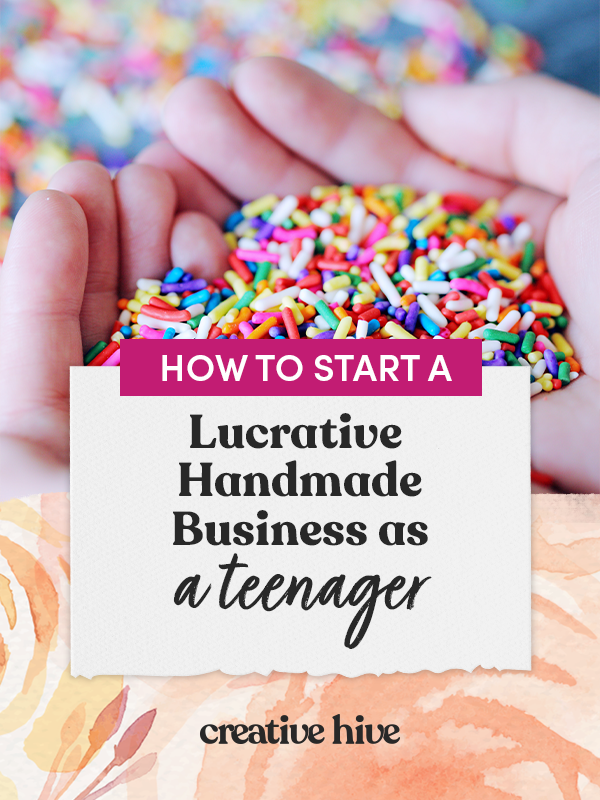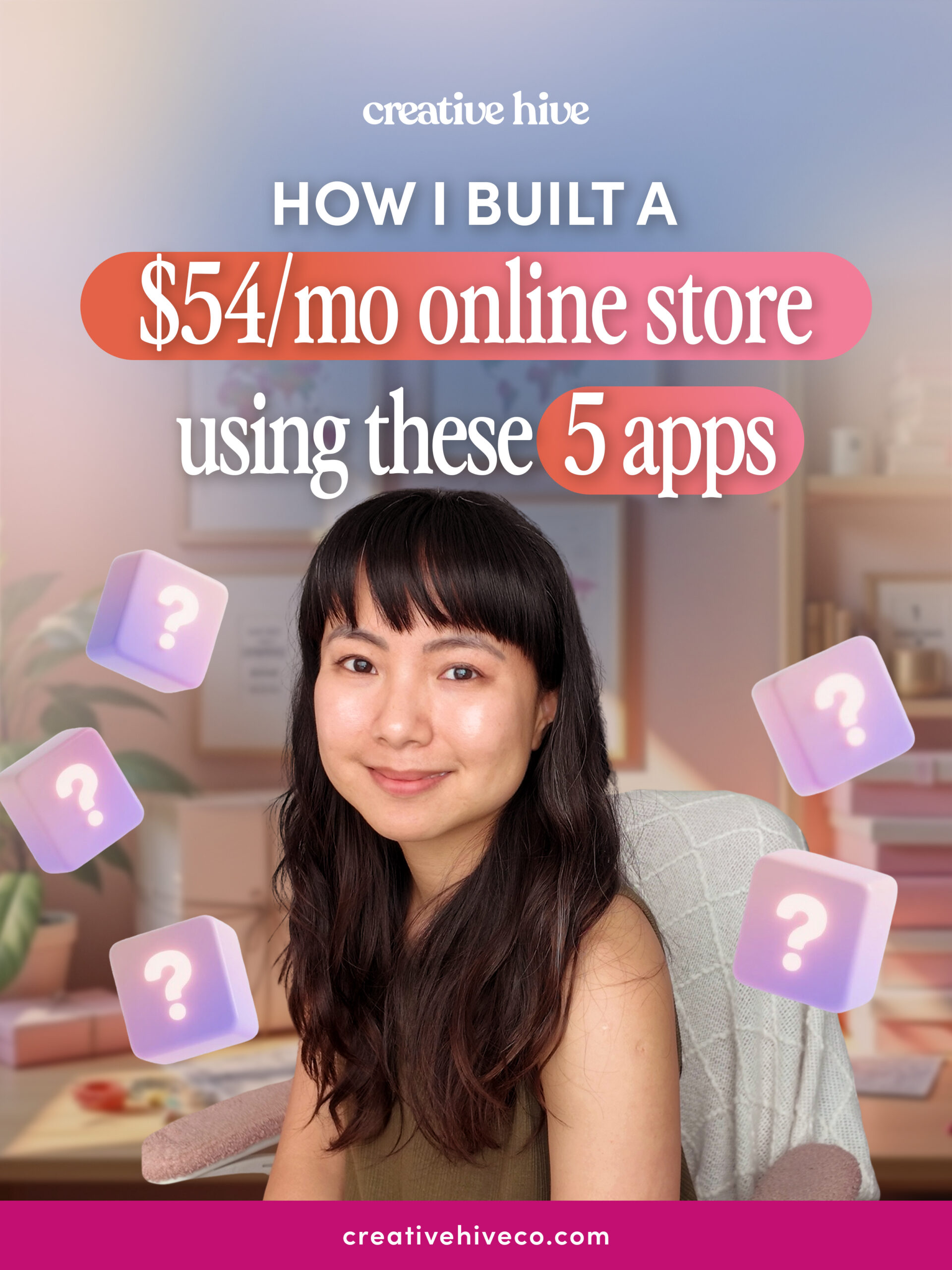How to Start a Lucrative Handmade Business as a Teenager
I want to help you build a sustainable, profitable handmade business that makes you consistent income and sales. I only ever teach or recommend marketing, social media, pricing, production and branding tips that I’ve personally used successfully in my own 7-figure handmade businesses.
I'm Mei, from Los Angeles!
Read More
Popular Posts You'll Love
Looking for something?
Categories
starting a business
get more traffic
running a business
make more sales
branding
growing a business
mindset & productivity
podcasts
pricing & money
product photography
reviews
selling on etsy
selling on amazon
social media
selling wholesale
- Facebook0
- Twitter6
- Pinterest14
- 20shares
Do you have an amazing idea for a business and you’re ready to put in the work to make it a reality?
There’s just one problem: you’re a minor.
You’ve got homework, after-school activities, and a social life to balance.
And you’re not really sure if you’re legally allowed to start a business until you’re 18.
These are legitimate concerns – but you’ve come to the right place.
I started my business when I was a minor, so I know all about running a business as a teenager.
The good, the bad, and the ugly.
I’m going to answer all of your questions about what it means to run a business as a teen.
I started my first business, Tiny Hands, when I was just fifteen-years-old.
I had just taken a jewelry making class with my mom, and really fell in love with it.
I also sold hand bound books and journals that I taught myself to make.
When I was still a teenager, I discovered polymer clay and the rest is Tiny Hands history.
Drive
When I was first starting out, I had the passion and the determination to run my own business.
I really believed in my dream.
But it wasn’t easy learning how to run a business while I was still in high school and had other priorities.
It was hard – but it wasn’t impossible.
If I can do it, you can too.
You might already have a great idea for the business you want to start.
Or, you might know you want to start a business, but aren’t sure what the product should be.
Some of us just have an entrepreneurial spirit, and that’s great!
Both the idea and the passion are key to running a successful business.
It doesn’t matter which comes first.
Ideas
There are a ton of businesses that teenagers can start.
If you’re particularly good at a certain subject in school, and you like working with kids or other teens, you can start a tutoring or babysitting business.
There are websites like Care.com where you can set up your profile, run a background check, and connect with families in search of someone like you.
Tutoring and babysitting are great because they really don’t cost you anything to start.
You might have to pay $15 for a background check and find a ride to their house for a session, but that’s basically it.
Plus, working with other teens and kids can be super rewarding.
You can also run errands for people.
Check if any of your neighbors need help getting groceries or dropping a package off at the post office.
They’ll likely appreciate the extra help, and might even give you a tip!
For this kind of job, you’ll just need a car (and a driver’s license of course).
You can also ask neighbors if you can:
- walk their dogs
- do chores around their house
- mow their lawn
- snow blow or shovel
- or wash their windows
I’m willing to bet most people won’t turn away the chance to relax for an hour instead of spending it mowing their lawn.
You’ll need to supply yourself with whatever equipment you need for that particular chore, unless you plan on asking to borrow the homeowner’s.
When I started out, I actually did retail arbitrage for a while!
Retail arbitrage is when you buy something from a local store and then sell it for a higher price.
I bought a packet of amethyst stones, broke them down into smaller packages and resold them at a higher price to make a profit.
This is a good idea for anyone who wants to jump into operating a product based business.
Of course, you can also make your own products.
When I started out, I was selling my own handmade journals and jewelry.
Today, I sell jewelry made of polymer clay.
This is a really rewarding experience for so many business owners – but it will require a bit of work.
You’ll have to make sure you can make enough of a product to keep up with the demand.
And that you can afford to buy all the supplies you’ll need.
Not to mention the cost of paying for classes or books to teach yourself how to make that craft.
Still, if this is something you’re really passionate about, you should absolutely go for it.
If you do want to sell your own products, POD (or Print on Demand) is a great place to start for artists.
With this option you won’t have any upfront costs and you still get to use your creative side to make the designs!
You can make anything from pillows to prints with your art on it, and it’s relatively easy.
The POD company you choose to work with will handle manufacturing, packing, and shipping – so all you need to do is make the product and promote it.
Legalities
Now that you have an idea, you’ll need to get into the legality of your business.
I have to put a disclaimer here to say I’m not a lawyer so this is not legal advice.
Consult with a lawyer and/or research your local state government laws before starting your business.
The good news is that for the most part, people under 18 are legally allowed to run their own businesses in the US.
Sole Proprietorship
You can register your business as a sole proprietor, even if you’re a minor.
A sole proprietorship is a business that is owned and run by one person.
In other words, the business owner and the business entity are not distinct from each other, legally.
A sole proprietorship is a good move for any teen who is serious about their business and considers it to be more than just a hobby.
If you’re working every single day, spending a lot on business expenses and pulling in a profit, you’ll want your business to be registered.
That way, everything is legal.
If you happen to have a larger business with employees, you might consider an LLC, but this isn’t necessary for most teenagers.
In fact, not all states even allow minors to operate an LLC, so stick with a sole proprietorship while your business is just starting out.
Hobby Business
Maybe you just want to run a hobby business.
You’ve got a lot going on with school and life, and you just don’t have time to throw yourself into building a business.
According to the IRS, you run a hobby business if you aren’t intending to make a profit and you don’t put considerable time into the business each week.
I imagine this will be the case for most teenagers.
You have limited free time to pour into your business and you probably aren’t relying on it for an income.
So, you won’t need to register your business if it’s a hobby business, which makes things a little easier.
That said, you will have to pay taxes if you bring in more than $600 in a single year, regardless of whether your business is registered.
If you have a hobby business, you won’t be able to deduct any of your supplies or business expenses from that year.

Getting Started
Once you’ve decided if you want to go for a sole proprietorship or just stick to having a hobby business, you can actually get started on the business itself!
It might sound cheesy, but the first thing you should do is get your family’s support.
Running a business is NOT easy – but if your family is on the same page and they’re encouraging and supportive, it can alleviate some of that hardship.
They can also help you to understand some of those legal documents you might be seeing for the very first time, like tax forms, contracts, and other paperwork.
If possible, you might also need your parent’s financial help in the beginning.
You don’t HAVE to spend a lot of money starting out, but every business will have an expense here and there.
Hopefully with enough hard work you can pay your family back when you start to see some sales come in.
I personally didn’t borrow money from my parents.
I saved up my daily lunch money and the money from the red packets I got on Chinese New Years.
Once you have your family’s support and your business is off the ground, make sure not to neglect your studies.
It can be SO hard to balance your business and your school work, and I know how tempting it is to prioritize business especially when you’re so passionate about it.
When I was starting out, my business absolutely got in the way of my studies – which led to some extremely stressful situations at school.
It’s impossible to exert an equal amount of energy into school and your business, because there are simply not enough hours in the day.
We all know teens need their sleep, too.
Stay Organized
If you’re having trouble balancing your business and your school work, start by getting organized.
Get a calendar (it can be a planner, a wall calendar, or even the app on your phone) and start marking down every appointment, every deadline, and every errand on your to-do list.
I suggest color coding schoolwork and business work, so you know exactly what’s what.
I used a paper planner back then and it was extremely helpful.
A calendar will not only keep you from forgetting to do important tasks, but it will also help you visualize your week and manage your time efficiently.
Hyper-organization is the key to being in school and running a business at the same time.
If you don’t keep track of anything, you’re bound to become overwhelmed and forgetful.
Goals
Just as important as getting (and using) that calendar, is setting goals and milestones.
There’s no reason you need to do everything all at once.
If you try, you’ll fail.
It’s just not possible.
Instead, set manageable weekly goals for yourself and celebrate every time you complete a goal or reach a milestone.
This will give you baby steps to aim for, which will help you take your time getting things done, instead of trying to rush to complete everything at once.
Production
If you feel like you’ve got a good handle on your time management, you can start making your product!
If you’re selling something handmade, take the time to really perfect your craft.
The better you are at your art, the easier it’ll be to sell.
People don’t want to pay for products that look cheap or half baked – they want to buy something that was made with care.
Don’t try to rush through making your products so you can get to selling them.
While you’re practicing your craft, learn all there is to know about starting a business.
From how to price your products to where to market them to how to handle customer service (and everything in between).
Check out my channel to watch videos that focus on these specialized tasks.
The more you learn, the better off your business will be.
Some people think that if they’re REALLY talented at making their art or if they’re REALLY good at the business side of things, they don’t need to be good at the other.
In truth, a successful business masters both the product and marketing.
Even if a product is amazing, a business will fail if no one knows you exist, or if your website isn’t user friendly.
So, study up!
You’ll be glad you did.
Selling Your Product
When it comes to where to sell, I actually recommend that you use Etsy.
I know that I usually say that you should have your own Shopify store, so you can be more in control of your business, but for teenagers, I think Etsy is a better idea.
Etsy is user friendly, safe to use, and most teens don’t have the pressure of making an income to pay for bills, so it’s okay if Etsy has all their fees and commissions.
An Etsy shop is a great place to:
- learn how an online business operates
- how to interact with customers
- and how to ship products, without you having to worry about making your own website
After you gain some experience on Etsy, if your business is growing and you see this being a long term career, you can then venture out to your own website.
Get Comfortable with Mistakes
My next tip for you is: know ahead of time that mistakes will happen.
This is a big learning curve, and when you’re balancing your business with school and the rest of your life, you’re bound to make mistakes.
That’s okay!
Be kind to yourself and commit to learning from every mistake you make, so you can do better next time.
I made so many mistakes starting out and I still mess up now and then.
But ultimately, the mistakes made me a better business owner, because I know how to handle pretty much every situation thrown my way.
Safety
Finally, be SAFE.
This is a big one.
It’s a scary world out there and when we’re running a business, we’ll be talking to strangers, exchanging money online, and putting ourselves in the public eye.
Have your families oversee your interactions with customers especially if you’re unsure about anything.
You rarely have to take business offline these days, so that helps protect you a little bit.
Keep all business operations online only.
As a business owner, no one should ever be asking YOU for money, so if someone does, this is a red flag.
Don’t share your passwords or any of your personal information beyond what’s necessary.
If you’re a minor and you want to operate your own business, don’t be afraid to follow that dream.
I dove into it headfirst when I was fifteen, and I’ve never looked back.
Trust me when I say that with some hard work, passion, and a willingness to learn, anyone can run a successful business – regardless of their age.
What are some of your business ideas?
Let me know in the comment section!
And don’t forget to check out my YouTube Channel for more great tips on running your handmade business!

Leave a Comment
Liked this article? Share it!
Unlock a Profitable Handmade Business
in Just 12 Weeks Without Using Etsy
or Social Media
FREE WORKSHOP
This workshop is for anyone who makes and sells a handmade or physical product, including jewelry designers, artists, paper designers, bath & body product makers and more!
What You'll Discover
The #1 mistake people make with Etsy & social media that causes shops to FLOP
The secret to making it with your handmade shop so it's no longer just a hobby
How to make sales in your handmade shop with ease so you can finally get to 6-figures
TAKE ME THERE
Your email address will not be published. Required fields are marked *
Leave a Reply Cancel reply
About
A Sale A Day
Student Login
Free Class
Contact
Terms
Watch On YouTube
Student Reviews
See My Handmade Shop!
YouTube Masterclass
Start Your Store Blueprint
Sell More Work Less



Starting a handmade business as a teenager can be a great way to turn a hobby into a profitable venture. The first step is to identify a unique and marketable product that can be created using skills and resources readily available. Next, research the market to determine the demand for the product and set a competitive price.
It is important to have a strong online presence and use platforms like Etsy, Instagram, and Facebook to showcase and sell your products. Building a loyal customer base is crucial for the success of any business, and offering excellent customer service can go a long way.
Another important aspect of running a successful handmade business is pricing strategy. Implementing an “everyday low pricing” strategy, as discussed in this article https://priceva.com/blog/everyday-low-pricing, can help establish credibility and attract price-sensitive customers. By offering high-quality products at fair prices, teenagers can start and grow a successful handmade business.
Thank you for this helpful information. My 14 year old grand daughter has asked me to be her mentor for her eighth grade school year capstone project. Her goal/aspiration for the project is to develop a DIY natural skincare product line. I have business startup skills and a passion/hobby of making all natural small batch cold process soap, but have little/no experience marketing products online. I would like to learn from you. Can you mentor a mentor?
I want to start selling braclets online I’m 14 and want to start a buiness .